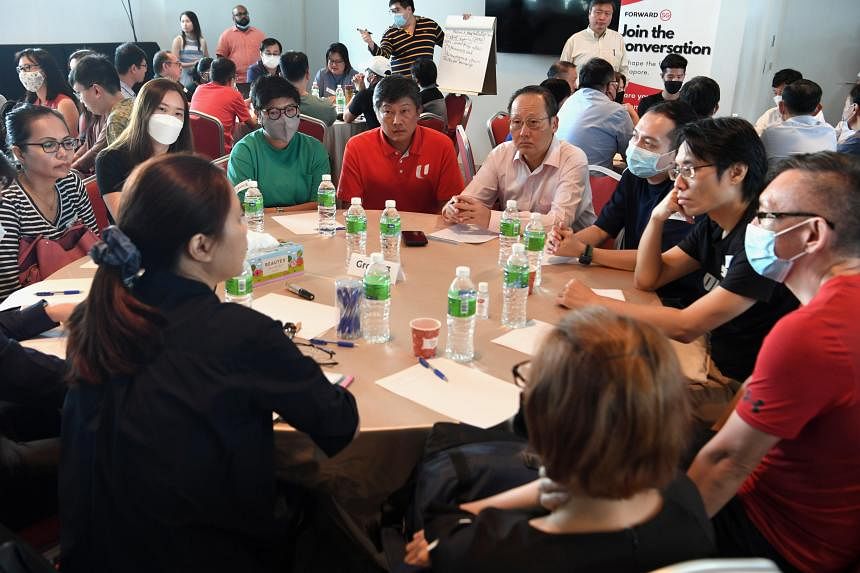SINGAPORE – Beyond providing training courses, the Government will help Singaporean workers identify jobs they like in promising sectors, set longer-term career goals, and take ownership of their career journey.
Minister for Manpower Tan See Leng, a trained medical doctor, said that this move will equip workers with the ability to maintain their “career health”, using a healthcare analogy in his speech to kick off a closed-door dialogue with more than 60 professionals, managers and executives (PMEs) on Wednesday.
Dr Tan and labour chief Ng Chee Meng later fielded questions during the dialogue, held under the Empower pillar of the Forward Singapore engagement exercise. The dialogue took place at The Star Performing Arts Centre in Buona Vista.
Mr Kenny Tan, divisional director for manpower planning and policy at the Ministry of Manpower (MOM), was the moderator.
Dr Tan, who is also Second Minister for Trade, and Mr Ng lead engagements on jobs and the economy under the pillar, together with Senior Minister of State for Manpower Koh Poh Koon.
Providing an update on the progress of dialogues under the Empower pillar since the exercise’s launch in June by Deputy Prime Minister Lawrence Wong, Dr Tan said participants were largely concerned about educational, training and job opportunities, as well as assurance over unemployment support and retirement adequacy.
To address these concerns, Singapore’s social compact will need to be refreshed, said Dr Tan, as he mooted several aspects that it could include.
Among them are empowering workers to find and work towards new opportunities with “health checks” on one’s career progress driven by artificial intelligence and data, a personalised career plan that spells out “healthy habits” to help them pursue their aspirations, and supporting their quick recovery from unemployment to re-enter the workforce.
They will also need to be assured that they have a fair shot at being a specialist or leader in their field, with opportunities to gain the international exposure, experience and skills that are needed.
Vocational skills will be valued as fairly as cognitive abilities in an inclusive labour market, with society ready to pay higher fees to recognise the value of these skills, while those approaching retirement who consistently make Central Provident Fund contributions can be assured their basic retirement needs are met, Dr Tan said.
Underscoring the need to help unemployed workers bounce back, he noted that more people may become jobless through no fault of their own, as more volatile economic growth and shortening economic cycles are set to drive more frequent employment shocks.
“Such shocks would hit our lower-income households the hardest, as they often have less savings buffers to tide them through,” he added.
He said the ministry is looking at how to provide better support to displaced workers, and addressing their desires for an unemployment support scheme.
Noting that any such scheme needs careful structuring, Dr Tan said: “The goal is to help as many workers as we can to bounce back into a job, by encouraging them to be persistent and enabling them to be effective in their job search.”
His comments come after NTUC assistant secretary-general Patrick Tay said on Oct 26 that MOM had not addressed the call from an NTUC-Singapore National Employers Federation task force in 2021 for a national unemployment support scheme that pays involuntarily unemployed PMEs.
Dr Tan also spoke about how staying open to global talent and ongoing moves to transform the Singapore economy will enable the creation of good jobs.
In his speech, Mr Ng said that as the share of PMEs in Singapore’s workforce expands, the labour movement needs to better understand and champion the interests of PMEs, as well as bring more of them on board.
Mr Mohamed Noor Abdullah, a participant in Wednesday’s dialogue, said he took part to understand how Singapore’s workforce policies are evolving.
The security manager, 44, expressed hopes that training courses, such as those he attended to qualify for his current job, would be made more interactive in future, with role-playing elements that could be better applied to real-life scenarios.
He added: “Right now, if we just have the textbook, we may forget after just one to two weeks.”


